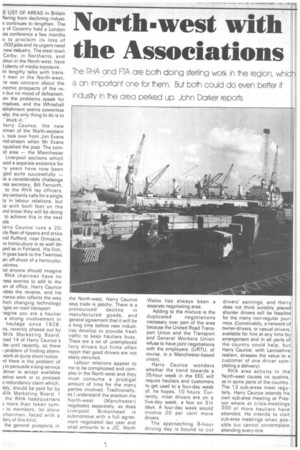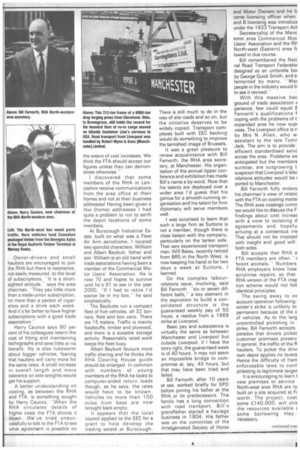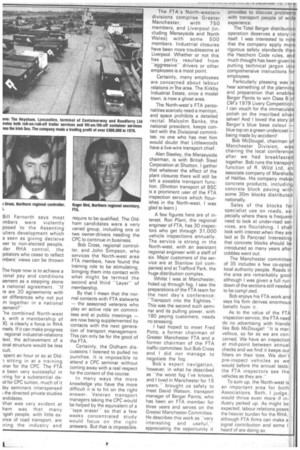North-west with the Associations
Page 52

Page 53

Page 54

If you've noticed an error in this article please click here to report it so we can fix it.
The RHA and FTA are both doing sterling work in the region, whiCh is an important one for them, But both could do even better if
indus-ry in the area perked up John Darker reports E LIST OF AREAS in Britain fering from declining industcontinues to lengthen. The y of Coventry held a London :ss conference a few months o to proclaim its loss of ,000 jobs and its urgent need new industry. The steel town Corby, in Northants, and atton in the North-west, have J•plenty of media exposure. In lengthy talks with trans-t men in the North-west, re was concern about the inomic prospects of the ren but no mood of defeatism. en the problems speak for mselves, and the Whitehall ]blishment seems powerless ielp, the only thing to do is to stuck in."
-larry Caunce, the new irman of the North-western took over from Jim Evans nid-stream when Mr Evans iquished the post. The corn_id area — the Manchester Liverpool sections which wed a separate existence for
years have now been .ged quite successfully 3S a considerable challenge rea secretary, Bill Farnorth, to the RHA lay officers. Dry certainly calls for a single ty in labour relations, but 3e with both feet on the Ind know they will be doing to achieve this in the next We.
larry Caunce runs a 20cle fleet of tippers and artics iral Rufford, near Ormskirk, re horticulture is as well deped as in Fenland. His firm, :h goes back to the Twenties an off-shoot of a horticultuLisiness.
.ist anyone should imagine RHA chairmen have no less worries to add to the en of office, Harry Caunce rates the reverse, and his rience also reflects the way hich changing technology iges on road transport.
lagine you are a haulier a strong involvement in haulage since 1926. ns, recently phased out by Milk Marketing Board, Died 14 of Harry Caunce's :les until recently, so there problem of finding alternwork at quite short notice. id there is the problem of j to persuade a long-service driver to accept available iative work or to proceed 3 redundancy claim which, ibly, should be paid for by Mk Marketing Board. I the RHA headquarters
more than token sym to members, let alone chairmen, faced with a Jary of this kind.
the general prospects in the North-west, Harry Caunce says trade is patchy. There is a pronounced decline in manufactured goods, and general agreement that it will be a long time before new industries develop to provide fresh traffic to keep hauliers busy. There are a lot of unemployed lorry drivers but firms often report that good drivers are not easily recruited.
Labour relations appear to me to be complicated and complex in the North-west and they must consume a prodigal amount of time for the many parties involved. Traditionally, as I understand the position the
North-west (Manchester) negotiates separately, as does Liverpool. Birkenhead is autonomous with a full agreement negotiated last year and what amounts to a JIC. North
Wales has always been a separate negotiating area. Adding to the mixture is the duplicated negotiations necessary over part of the area because the United Road Transport Union and the Transport and General Workers Union refuse to have joint negotiations with the employers. (URTU, of course, is a Manchester-based union).
Harry Caunce wonders whether the trend towards a 35-hour week in the EEC will require hauliers and customers to get used to a four-day week of, he hopes, 10 hours. Currently, most drivers are on a five-day week, a few on 51/2 days. A four-day week would involve 20 per cent more drivers.
The approaching 8-hour driving day is bound to cut drivers' earnings, and Harry does not think suitably placed shunter drivers will be feasible for the many non-regular journeys. (Conceivably, a network of owner-drivers, or casual drivers, available for hire at any time by arrangement and in all parts of the country could help, but Harry Caunce, with Lancashire realism, stresses the value to a customer of one driver completing a delivery).
RHA area activity in the North-west causes no qualms, as in some parts of the country. The 13 sub-areas meet regularly. Harry Caunce attends his own sub-area meeting at Preston where at crisis-meetings 300 or more hauliers have attended. He intends to visit sub-area meetings when possible but cannot contemplate attending every one.
Owner-drivers and small hauliers are encouraged to join the RHA but there is resistance, not easily measured, to the level of subscriptions. "It is a shortsighted attitude,'" says the area chairman. -They pay little more than a trade-union subscription, no more than a packet of cigarettes and a drink each week. And it's far better to have higher subscriptions with a good trade association."
Harry Caunce says 80 per cent of his colleagues resent the cost of fitting and maintaining tachographs and sees little or no benefit, He is also lukewarm about bigger vehicles, fearing that hauliers will carry more for the same rates. A small increase in overall length and more tolerance on axle weights would get his support.
A better understanding on costing, as between the RHA and FTA, is something sought by Harry Caunce. "When the RHA circulates details of higher costs the FTA shoots it down. We've tried unsuccessfully to talk to the Fl A to see what agreement is possible on the extent of cost increases. We think the FTA should accept our figures unless they can demonstrate otherwise."
I discovered that some members of the RHA in Lancashire receive communications from the area office at their homes and not at their business addresses! Having been given a few (home) addresses I had quite a problem to run to earth the depot locations of some members.
At Burscough Industrial Estate, built on what was a Fleet Air Arm aerodrome, I located two spendid characters, William and Albert Baybutt, father and son. William is an old hand with trade associations having been a member of the Commercial Motor Users' Association. He is now 70 and hopes to survive until he's 91 to see in the year 2000. "If I had to retire I'd sooner be in my box,he said emphatically.
The Baybutts run a compact fleet of five vehicles, all 32 tonners, flats and box vans. There are 15 trailers. Traffic is mainly foodstuffs, timber and plywood, and there is a sizeable storage activity. Reasonably rated work keeps the fleet busy.
Albert Baybutt favours more traffic sharing and he thinks the RHA Clearing House guide should be enlarged. In common with numbers of young members of the RHA he looks to computer-aided return loads though, as he says, the rates would have to be known. Vehicles no more than 100 miles from base are now brought back empty, It appears that the local council applied to the EEC for a grant to help develop the trading estate at Burscough. There is still much to do in the way of site roads and so on, but the initiative deserves to be widely copied. Transport complexes built with EEC backing would do something to improve the tarnished image of Brussels.
It was a great pleasure to renew acquaintance with Bill Farnorth, the RHA area secretary, at Manchester. His organisation of the annual tipper conference and exhibition has made Bill's name a by-word. Now that his talents are deployed over a wider area I'd guess that his genius for a smooth-running organisation and his talent for firm diplomacy will serve members well.
I was surprised to learn that such a large firm as Suttons is not a member, though there is close liaison with the company, particularly on the tanker side. That very experienced transport man, Wilf Bates, recently retired from BRS in the North West, is now keeping his hand in for two days a week at Suttons, I learned.
On the complex labourrelations issue, involving, said Bill Farnorth -six or seven different balls," a key element in the aspiration to build a consolidated structure is the guaranteed weekly pay of 50 hours, a residue from a 1968 strike at Liverpool.
Basic pay and subsistence is virtually the same as between Manchester and Liverpool but outside Liverpool, if I have the story right, the guaranteed week is of 40 hours. It may not seem an impossible bridge to compromise at, say, 45 hours, but that may have been tried and failed.
Bill Farnorth, after 10 years at sea, worked briefly for SPD before joining his father at the RHA or its predecessors. The family has a long connection with road transport. Bill's grandfather started a haulage business in 1904. His father was on the committee of the Amalgamated Society of Horse and Motor Owners and he b came licensing officer when and B licensing was introduc( under the 1933 Transport Act Secretaryship of the Manc ester area Commercial Mot Users' Association and the RH North-west (Eastern) area f( lowed in due course.
Bill remembered the Nati nal Road Transport Federatio designed as an umbrella bo( by George Quick Smith, and s. lamented by many. "Mar people in the industry would Ii to see it revived .
With this massive bac ground of trade association E perience, few could equal E Farnorth's qualifications f coping with the problems of t expanded area he now sup( vises. The Liverpool office is n by Mrs N. Allen, who w assistant to the late Tomr Jack. The aim is to provide efficient standardised servi across the area. Problems WE anticipated but the members surmise, are outgrowing t suspicion that Liverpool's labc relations attitudes would be ( ported to Manchester.
Bill Farnorth fully endors his chairman's view of relatio with the FTA on costing matte The RHA area costings comrr tee would like to discuss the F' findings about cost increaE with a view to isolating d agreements and hopefu arriving at a consensus vie That should not be impossil with insight and good will both sides.
Bill accepts that RHA a FTA members are often -c ferent animals." Numbers RHA employers know how scrutinise repairs, so that RHA version of the FTA insp tion scheme would not foil identiCal principles.
The swing away to oy account operation following winter's strike is unlikely to permanent because of the c of vehicles. As to the larg uncontrolled picketing in strike, Bill Farnorth accepts paradox that drivers picket customer premises preserv in general, the traffic of the R hauliers, To picket the driv( own depot applies no levera Hence the difficulty of fram enforceable laws to conf picketing to legitimate target It is encouraging to learn t new premises to service North-west area RHA are to built on a site acquired at worth. The project, cost some £140,000, will stre the resources available E some borrowing may necessary. Bill Farnorth says most !mbers were violently posed to the Assenting uliers development which s seen as giving decisive filer to non-elected people. der RHA control, the jotiators who cease to reflect mbers' views can be thrown rhe hope now is to achieve a ional pay and conditions eement as a stepping stone a national agreement. "If re are 20 agreements with !or differences why not put m together in a national aement?'' The combined North-west a, with a membership of )0, is clearly a force in RHA nsels. If it can make progress regional industrial-relations text, the achievement of a onal structure would be less cult.
spent an hour or so at Old-1 sitting in at a training 'Mar for the CPC. The FTA e been very successful in iring for a substantial deid for CPC tuition, much of it lay seminars interspersed ! the directed private studies 3ndidates.
Vhat was very evident at ham was that many lgish people, with little exance of road transport, are ring the industry and require to be qualified. The Oldham candidates were a very varied group, including one or two owner-drivers needing the CPC to continue in, business.
Bob Cross, regional controller, and John Simpson, who services the North-west area FTA members, have found the training role to be stimulating, bringing them into contact with what might be termed the second and third "Layer" of membership.
By that I mean that the normal contacts with FTA stalwarts — the seasoned veterans who play an active role on committees and at public meetings — are now being supplemented by contacts with the next generation of transport management. This can only be for the good of the FTA.
Certainly, the Oldham discussions I listened, to pulled no punches. It is impossible to .attend a CPC seminar without coming away with a real respect for the content of the course.
In many ways the more knowledge you have the more difficult it is to hit on the right answer. Veteran transport managers taking the CPC would be helped by the equivalent of a ''tape eraser' so that a few weeks concentrated study would focus on the right answers. But that is impossible. The FTA's North-western divisions comprise Greater Manchester, with 750 members, and Liverpool (including Merseyside and North Wales) with some 500 members. Industrial closures have been more troublesome at Liverpool. Whether or not this has partly resulted from "aggressive" drivers or other employees is a moot point.
Certainly, many employees are concerned about labour relations in the area. The Kirkby Industrial Estate, once a model town, is now a ghost area.
The North-west's FTA personalities scarcely need a mention, and space prohibits a detailed recital. Malcolm Banks, the national president, keeps contact with the Divisional committee; no one who has met him would doubt that Littlewoods have a live-wire transport chief.
Alan Steeley, the Merseyside chairman, is with British Steel Corporation at Shotton. I gather that whatever the effect of the plant closures there will still be left a sizeable transport function. (Shotton transport of BSC is a prominent user of the FTA inspection service which flourishes in the North-west, I was glad to learn.) A few figures here are of interest. Ron Plant, the regional engineer of FTA, has 30 inspectors who get through 31,000 vehicle inspections annually. The service is strong in the North-west, with an assistant, regional engineer with a staff of six. Major customers of the service are at Stanlow (oil companies) and at Trafford Park, the huge distribution complex.
Whilst I was at Manchester, holed up through fog, I saw the preparations of the FTA team for the next day's conference: "Transport into the Eighties." This was the second such seminar and its pulling power, with 180 paying customers, needs no stressing.
I had hoped to meet Fred Potts, a former chairman of Greater Manchester FTA and a former chairman of the FTA traffic committee; but Bob Cross and I did not manage to negotiate the fog.
Bob's expert navigation, however, in what he described as "the worst fog I've known, and I lived in Manchester for 15 years," brought us safely to meet David Watson, transport manager of Berger Paints, who has been an FTA member for three years and serves on the Greater Manchester Committee. He describes this work as • 'very interesting and useful," appreciating the opportunity it provides to discuss problem, with transport people of wide experience.
The Total Berger distribution operation deserves a story in itself. I was interested to note that the company apply more rigorous safety standards than the Hazchem Code rules, and much thought has been given to putting technical jargon into comprehensive instructions for employees.
Particularly pleasing was to hear something of the planning and preparation that enabled Berger Paints to win Class B of CM's 1979 Livery Competition.
I can vouch for the immaculate polish on the inscribed silver salver! And I loved the story of Berger's blue base colour — blue top on a green undercoat — being made by accident!
Bob McDougal, chairman of Manchester Division, was chairing the local conference after we had breakfasted' together. Bob runs the transport, function of R. Wild Ltd, an associate company of Marshalls
of Halifax. His company makes concrete products, including concrete block paving with, some 30m blocks distributed nationally.
Sales of the blocks for specialist use on roads, es
pecially where there is frequent need to look at under-road services, are flourishing. I shall look with interest when they are laid at St Pancras! Interesting that concrete blocks should be introduced so many years after cobbles went out.
The Manchester committee of 35 includes a few co-opted local authority people. Roads in the area are remarkably good although I was given a full rundown of the sections still needed to be complAed.
Bob enjoys his FTA work and says his firm derives enormous benefit from it As to the value of the FTA inspection service, the FTA need do no advertising with friends like Bob McDougal! "It is marvellous, so far as we are con cerned. We have an inspection at mid-point between annual checks and we find it keeps our fitters on their toes. We don't pre-inspect vehicles as we would before the annual tests; the FTA inspectors see the vehicles as they are."
To sum up, the North-west is an important area for both Associations. Both, I judge, would thrive even more if industry perked up. As might be expected, labour relations poses the heavier burden for the RHA, although FTA firms can make a signal contribution and some I heard of are doing so.




















































































































